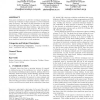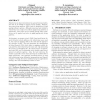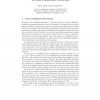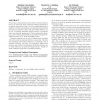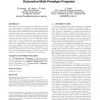125
click to vote
PPDP
2004
Springer
15 years 7 months ago
2004
Springer
Semi-naive evaluation is an effective technique employed in bottom-up evaluation of logic programs to avoid redundant joins of answers. The impact of this technique on top-down e...
116
click to vote
PPDP
2004
Springer
15 years 7 months ago
2004
Springer
We introduce just enough tabling (JET), a mechanism to suspend and resume the tabled execution of logic programs at an arbitrary point. In particular, JET allows pruning of tabled...
133
click to vote
PPDP
2004
Springer
15 years 7 months ago
2004
Springer
Refactoring in object-orientation has gained increased attention due to its ability to improve design quality. Refactoring using design patterns (DPs) leads to production of high ...
123
click to vote
PPDP
2004
Springer
15 years 7 months ago
2004
Springer
We present a generalisation of first-order rewriting which allows us to deal with terms involving binding operations in an elegant and practical way. We use a nominal approach to...
111
click to vote
PPDP
2004
Springer
15 years 7 months ago
2004
Springer
Object Petri nets (OPNs) provide a natural and modular method for modelling many real-world systems. We give a structure-preserving translation of OPNs to Prolog by encoding the O...
126
click to vote
PPDP
2004
Springer
15 years 7 months ago
2004
Springer
The new generic scheme CFLP(D) has been recently proposed in [24] as a logical and semantic framework for lazy constraint functional logic programming over a parametrically given ...
142
click to vote
PPDP
2004
Springer
15 years 7 months ago
2004
Springer
We investigate some fundamental properties of the reduction relation in the untyped term calculus derived from Curien and Herbelin’s λµµ. The original λµµ has a system of ...
116
click to vote
PPDP
2004
Springer
15 years 7 months ago
2004
Springer
We introduce the theoretical basis for tracing lazy functional logic computations in a declarative multi-paradigm language like Curry. Tracing computations is a difficult task due...
